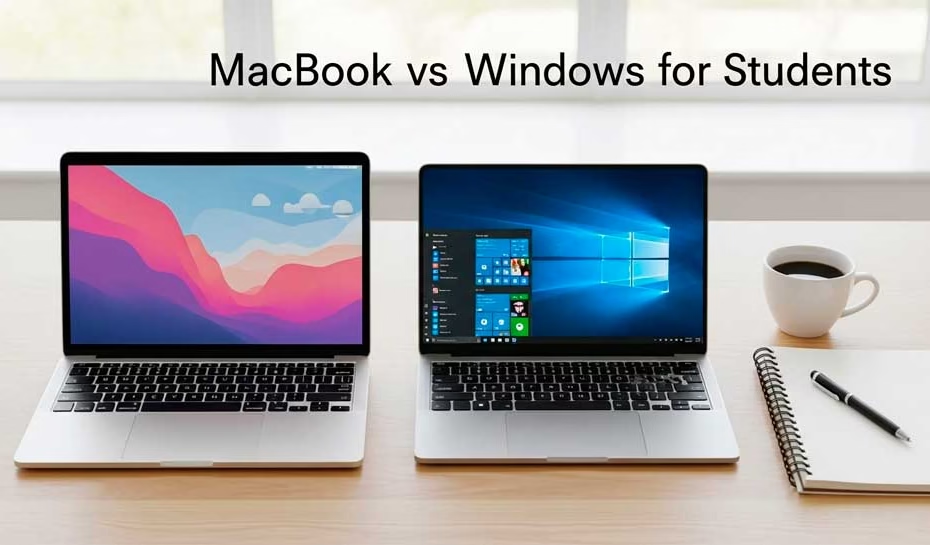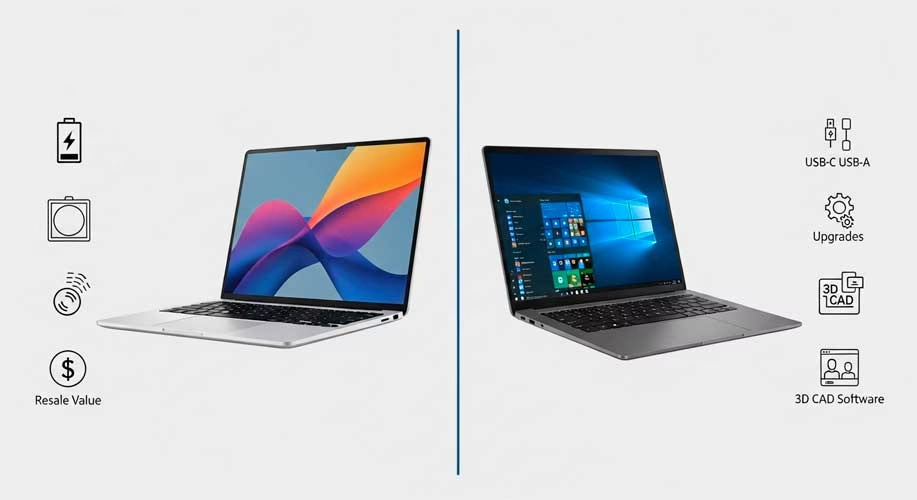If you’re torn between a MacBook vs Windows laptops for students, here’s the truth: this choice isn’t about fancy specs—it’s about sailing through semesters without tech drama. You need a light machine that wakes instantly between lectures, lasts all day, runs the apps your school actually requires, and won’t torch your eyes during midnight study sprints. Add in total cost of ownership (purchase + accessories + repairs + resale) and ecosystem fit (iPhone/Android, iPad/tablet), and the decision gets real—fast.
This guide turns those real-life situations—major-specific software, campus IT quirks (printing, proctoring, VPNs), battery + portability, repairs during exam season, and long-term budget—into a clear pick you can make today with confidence.
Who This Guide Is For (and What Actually Matters Day-to-Day)
You’re a budget-conscious undergrad (17–24) who wants a laptop that will comfortably last 4–5 years. In practice, that means:
- All-day battery for back-to-back classes and library hops.
- Instant wake, so you’re ready before the professor flips to slide two.
- Comfortable keyboard + great trackpad for marathon note-taking.
- Eye-friendly display (brightness + color + low flicker).
- Software certainty: from Google Docs to Adobe, MATLAB, CAD, coding IDEs, and proctoring tools.
- TCO awareness: dongles or upgrades, accidental damage coverage, and resale value at graduation.
Personal take woven throughout: I value wake-from-sleep more than raw CPU; battery life that truly lasts a full class day; and TCO (dongles vs. upgrades, and resale) mattered more than I expected.
MacBook vs Windows for Students: The Quick Verdict
Short answer:
- Pick a MacBook Air if you want best-in-class battery life and a low-friction experience for writing, research, coding (except Xcode-specific needs if you’re not on macOS), and most creative work.
- Pick a Windows ultrabook if your major mandates Windows-only apps (e.g., SolidWorks/industry CAD), if you want a touchscreen/stylus workflow, or if you’re gaming on the side.
Pros & Cons at a Glance
| Choice | Best for | Big Wins | Watch-outs |
|---|---|---|---|
| MacBook Air (Apple Silicon) | Writing, business, CS, design/audio, “I just want it to work” | Exceptional battery; silent/fanless; A-grade trackpad & keyboard; strong resale | Two USB-C ports (expect a hub); some niche Windows-only tools require workarounds |
| Windows Ultrabook (Intel/AMD/ARM) | Engineering/CAD, broader hardware choice, touch/stylus, light gaming | Wider port selection; upgrade options on some models; native Windows-only software | Battery varies by model; bloatware on some brands; ARM Windows app compatibility varies (check with your department) RTINGS.com |
Data anchor: In recent lab testing roundups, MacBook Air 13 (M4) is the “Best Laptop for College,” with measured ~12.3 hours of web battery, a bright ~445-nit screen, and top-tier usability; Surface/other Windows options are competitive, but Windows on ARM may face app gaps—verify with your school. RTINGS.com
Price & Total Cost of Ownership (TCO) Over 4–5 Years
TCO is where many students are surprised. Macs can cost more upfront but often retain value better; Windows laptops may let you upgrade RAM/SSD later and can be cheaper to enter.
| TCO Element | MacBook Air | Windows Ultrabook |
|---|---|---|
| Upfront price | Generally higher for similar build | Wider range; more deals/tiers |
| Accessories | Likely USB-C hub, extra charger | Often no hub needed; some include HDMI/USB-A |
| Upgrades | Not user-upgradeable (RAM/SSD fixed) | Many models allow SSD (and sometimes RAM) upgrades |
| Repairs/Warranty | Dense Apple Store/authorized network; AppleCare+ | Varies by brand; add accidental damage if offered |
| Resale value | Typically strong resale at graduation | Varies widely by model/brand/spec |
Tip: If you’ll need HDMI, SD, or USB-A often, either pick a Windows model with those ports built-in, or budget a reliable USB-C hub for Mac. On Windows, spec 16GB RAM if you can; if not, pick a model that lets you upgrade later.
Battery Life, Portability & Comfort
What matters on campus: real-world all-day battery, weight under ~3 lbs (1.4 kg) if you commute, a low-glare bright display, and a keyboard that still feels good at midnight.
- MacBook Air (M-series): routinely posts double-digit hours of web use in lab tests; fanless = silent in lectures; trackpad/keyboard are standouts.
- Windows Ultrabooks: top models match or nearly match all-day stamina; comfort and port layouts vary—read the model-level review, not just the spec sheet. Some Windows laptops with OLED are gorgeous; if you’re flicker-sensitive, look for flicker-free or high PWM frequency models.
Personal note: My real “win” was fast wake-from-sleep between classes—no waiting, no spinning fans.
Software & Class Requirements
This is the deciding factor for many students.
mac vs windows for engineering students
- Windows advantage: Many engineering apps (e.g., SolidWorks, specialized CAD/EDA) are Windows-only. If your department standardizes on those, choose Windows to avoid workarounds.
- Mac workarounds: Some students remote into a Windows lab VM or use virtualization—less ideal for day-to-day CAD.
Design/Media & Audio
- Both macOS and Windows run Adobe CC and popular DAWs well. Many creators like macOS for stability, battery life on the go, and color-reliable displays; Windows offers wider GPU variety and more ports.
Coding & CS
- For general CS, both platforms shine: VS Code, Git, Docker are cross-platform. If you need Xcode/iOS, Mac is mandatory. For low-level Windows APIs/.NET or certain class toolchains, Windows is convenient.
Campus IT: printing, VPN, proctoring
- Check your university’s printing drivers, VPN, and proctoring tool list (e.g., LockDown Browser). Both platforms are supported at many schools, but some tools are friendlier on Windows, and ARM Windows may not support certain legacy apps—confirm first.
Ecosystem Fit & Accessories
- Apple ecosystem: iPhone continuity (AirDrop, Notes, Messages, FaceTime, clipboard handoff) is frictionless.
- Windows ecosystem: broader device variety, touchscreen + pen options (Surface class devices), and better alignment with PC gaming.
Personal note: TCO isn’t just money—friction is a cost. I’d rather pay for a hub than fight with flaky drivers during midterms.
Performance: Apple Silicon vs Intel/AMD/Snapdragon on Windows
- Apple Silicon (M-series): excellent efficiency and quiet operation; more than enough for research, coding, light creative tasks.
- Intel/AMD: plenty of power in modern Ultra/Ryzen U-series thin-and-lights; pick a reputable model for thermals/keyboard quality.
- Snapdragon (Windows on ARM): promising battery + instant-on feel; check app compatibility (some programs aren’t native and can underperform or fail). Always verify with your course/software list before buying.
Service, Warranty & Easy Repairs During Exam Season
- Mac: Apple Store + authorized service centers mean predictable turnaround; AppleCare+ can be worth it if you’re accident-prone.
- Windows: varies by brand; look for accidental-damage coverage and on-campus service partnerships if your university offers them.
Pick Your Path: Scenario-Based Recommendations
Humanities & Business
- Priorities: battery, comfort, reliability, clean notes/PDF workflows.
- Pick: MacBook Air for simplicity and battery; or a Windows ultrabook with great keyboard and at least 11 hours tested battery.
Computer Science
- If you want iOS/macOS dev, get a Mac. Otherwise both are fine; spec 16GB RAM.
- Bonus: Many CS workflows (Git, Docker, WSL/Terminal) are smooth on either.
Engineering
- Choose Windows for SolidWorks/industry CAD and easier driver/plugin compatibility. (Yes, you can remote into lab VMs from a Mac, but daily CAD is smoother on native Windows.)
Design/Media
- MacBook Air/Pro for battery + color-reliable displays and consistent export times; Windows if you want OLED/touch and more ports.
Commuters & All-Day Note-Takers
- Lightest system with the most reliable wake + battery wins. MacBook Air or a vetted Windows ultrabook with proven lab-tested stamina.
Set-Up Checklist for Day One (Campus-Friendly)
- University VPN and printing installed and tested.
- Proctoring software verified on your exact CPU/OS (especially ARM Windows).
- Cloud backups (OneDrive, iCloud, Google Drive) + a basic Time Machine/Windows Backup routine.
- Note-taking app picked and synced (Notion, Obsidian, OneNote, Apple Notes).
- Battery profile set; fast sleep/wake enabled; night mode/True Tone/blue-light settings adjusted.
FAQ: macbook vs windows laptop for students
Is a MacBook Air enough for CS students?
Yes for most CS coursework (Python, Java, web, data science). If you need Xcode/iOS, Mac is required. For .NET/Windows-specific APIs, Windows can be more convenient (though many tools are cross-platform).
What about Windows on ARM laptops?
Great battery and instant-on feel, but check app compatibility; some programs don’t run natively and may underperform. Confirm with your department’s software list before buying.
Can I run SolidWorks on a Mac?
Not natively. Use a campus Windows VM or remote desktop if provided. For daily CAD, Windows is simpler.
Do I need a dongle on a Mac?
Often yes (HDMI/USB-A/SD). On Windows, many ultrabooks still include HDMI/USB-A; verify the exact port set on the model you’re buying.
What’s the smarter long-term buy?
If your apps are cross-platform, MacBook Air often wins on battery, low friction, and resale value. If your major is Windows-centric (engineering/CAD), a well-reviewed Windows ultrabook is the right call
Conclusion
Choosing between a macbook vs windows laptops for students is really choosing how you’ll get through college: low-friction, long-battery Mac simplicity vs. Windows flexibility for engineering-grade apps, touch/stylus, and broader hardware. Match the pick to your major, verify campus IT/proctoring, and budget for either a hub (Mac) or a RAM/SSD upgrade (Windows). Do that, and you’ll graduate with fewer tech headaches—and likely a higher resale value or a machine that’s still cruising.

